When Peter Tempelhoff boarded the flight from Cape Town to Valencia to attend The World’s 50 Best Restaurants 2023, little did he know he’d be taking some extra baggage back: Fyn, the chef’s first independent effort, was chosen to receive the Flor de Caña Sustainable Restaurant Award 2023. 50 Best speaks to Tempelhoff and Fyn CEO Paul Bruce-Brand to discover more about this South African gem and what makes it a global sustainability pioneer
The list of The World’s 50 Best Restaurants 2023 features plenty of one-of-a-kind restaurants – from a multi-course meal served under a dome coming alive with projections to a hyper-cool à la carte Parisian bistro – but perhaps none quite as multifaceted as Fyn, the winner of the Flor de Caña Sustainable Restaurant Award 2023. This contemporary dining room in the centre of Cape Town eclectically combines a Canadian-South African chef, ancient endemic ingredients that once contributed to the development of homo sapiens and techniques borrowed from Japan.
“As someone from Cape Town witnessing its often-very-homogenous culinary scene, the city was waiting for something like Fyn,” commented one of 50 Best’s 1,080 anonymous voters as part of the 2023 voting round. “Table Mountain may offer the view, but what happens on the table is far more inspiring,” adds another; and yet still a third: “Fyn continues to push their own boundaries into creating new, innovative dishes that shy away from the status quo.”
It all paints a clear picture that what’s happening at Fyn is quite special – as a chat with the senior team behind the restaurant soon confirms.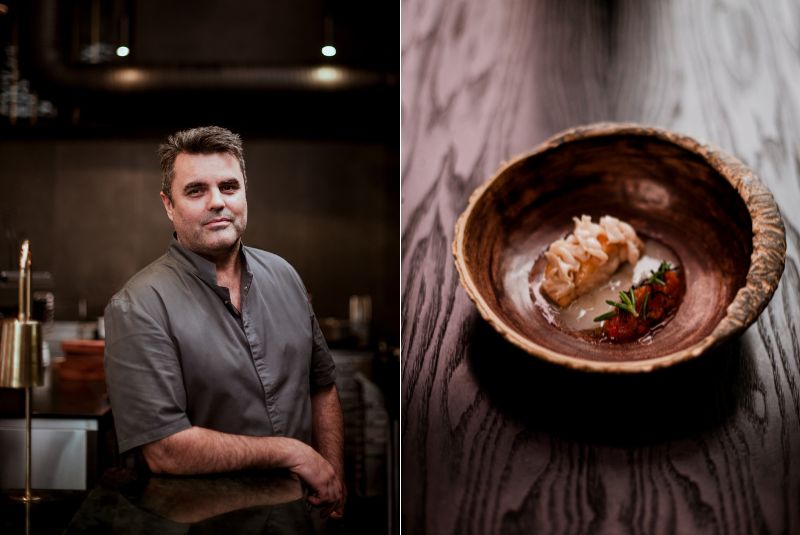
Chef Peter Tempelhoff uses time-honoured techniques in his dish of abalone in kelp with kingklip seaplants
Chef Peter Tempelhoff, the driving force behind the establishment, spent 10 years away from South Africa, first studying at the Culinary Institute of America in New York, then gaining experience in some of London’s best restaurants. When he returned home in 2006, it seemed like everything he touched turned into gold: he earned a Chef of the Year title from the Sunday Times in 2007 while heading up Grande Provence Restaurant in Franschhoek; then his next venture, Greenhouse in Constantia, was voted the best restaurant in the country by Eat Out.
But around 2008, a trip to Japan shook Tempelhoff to his core. He says he wasn’t “bored” of French or Italian cooking techniques, but looking behind the curtain into Japan’s kitchens allowed him a peek into a completely different gastronomic tradition. He became mildly obsessed with how the Japanese use raw ingredients, apply heat in specific ways or use salt and acid to coax intense flavours from their produce.
So when, in 2018, Tempelhoff was presented with an opportunity to open his own place, he knew that his restaurant would offer something unusual – not only because he was adamant about keeping his focus on Japanese techniques, but also because he wanted to apply them to endemic South African ingredients.
Cooking a time and a place
“The origin of ingredients has always fascinated me,” says the chef. “I only really get inspired if I know where the food that I’m preparing comes from. As I’ve been gathering plants and living creatures from the shore and sea, I have been fascinated to find out what our ancestors used to eat.”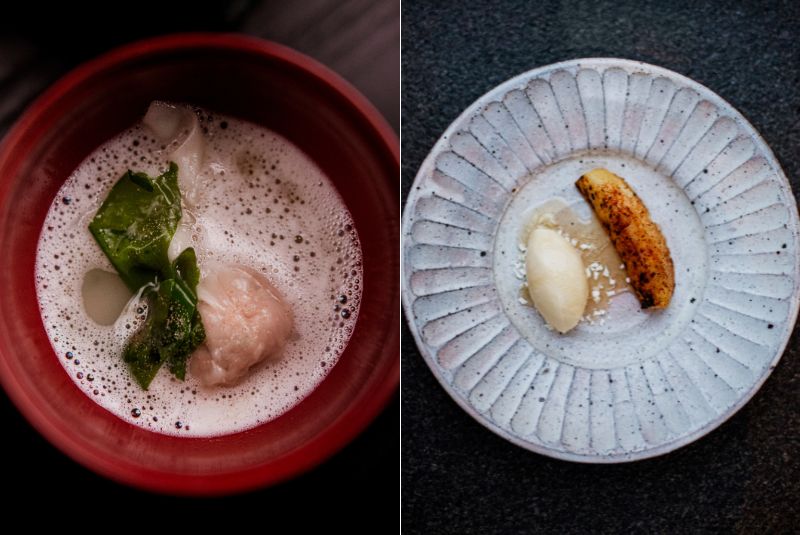
Guinea fowl wonton, tori paitan and sea lettuce; and robata pineapple with rice ice cream
Fyn CEO Paul Bruce-Brand, an industry veteran and recognised restaurateur who previously headed up Ellerman House, saw the potential in Tempelhoff’s keen interest. Soon, the pair met up with Jan De Vynck, a professor at the African Centre for Coastal Paleoscience at Nelson Mandela University, who – in the chef’s own words – “has made it his life’s mission to investigate early human existence and interaction with the Western Cape’s natural environment”.
If the link between gastronomy and paleoscience seems tenuous, allow Tempelhoff to change your mind. “I believe that somewhere within all of us is an instinctive yearning to know where we came from,” he says. “The southern area of South Africa boasts overwhelming archaeological evidence as the home of our species and where we became complex beings. A key driver for this human cognitive revolution was food.”
At the heart of Professor De Vynck’s research is the Fynbos, after which the chef named the restaurant itself: it’s a coastal and mountainous ecoregion located across the Western and Eastern Cape provinces of South Africa, famous for its exceptional biodiversity and endemism. “Studies are showing that the homo sapiens might have evolved from this region in South Africa,” explains Tempelhoff. “Partly because of what they ate, and especially the omega-rich seafood and plants they ate, their brains grew and developed over thousands of years.”
The chef was hooked. He persuaded De Vynck to travel with him across the Cape Floristic Region, the smallest of the six floral kingdoms recognised globally but also one of the most biodiverse, to show him the foodstuff of his forebears. Tempelhoff began tasting and cooking with different ingredients, uncovering a wealth of endemic species whose gastronomic use had been lost over the course of the millennia.
Ancient South Africa on the plate
Armed with a vast array of little-known ingredients in his pantry and a wealth of knowledge of Japan’s culinary techniques, Tempelhoff set to work. He built his dining room entirely through the work of local craftspeople and asked his designer to focus on the parallels between South African and Japanese cultures, leading him to come up with an eye-catching ceiling feature reminiscent of both African beads and a Japanese abacus.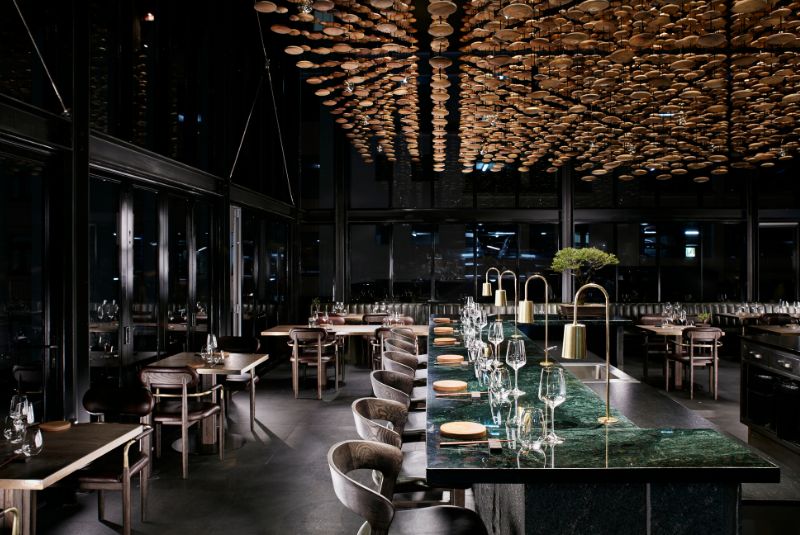
Fyn's decor and design connect Japanese and South African cultures
Next, he delved into ancient ingredients through a process he describes as “a lot of trial and error, and a lot of spitting out”. Going beyond South Africa’s most well-known endemic plants, such as rooibos and buchu, he travelled back in time to test new uses for unusual produce from both the earth and the sea.
The chef describes his research into kelp as one such example. “At the beginning, we were using kombu from Japan, but then we looked around our oceans and there are kelp forests covering the whole coastline,” he says. “Thousands of years ago, the locals would cut the kelp stems and stuff them with tough seafood, then put them on the fire so they would almost pressure cook the ingredient inside, tenderising it.”
Tempelhoff uses a similar technique for his abalone in kelp dish, where the delicacy is sliced and cooked inside a kelp stem with garlic and wine, then the algae is cut open at the table in front of the diner in theatrical fashion, revealing the tender piece of seafood inside. His experiments with the seaweed have also led him to using its double layer like a stuffed pasta, filling it with different local flavours.
Living and breathing ethical gastronomy
The chef’s work naturally led him towards a sustainable ethos. Most of the ingredients the kitchen uses are not only grown locally but are also native, telling a story of what South Africans used to eat thousands of years ago. The furniture, design and wine list at the restaurant are all inspired by the country, leading Tempelhoff to say that “for lack of a better description, Fyn is a place where people can come and enjoy what different local professionals have produced”. 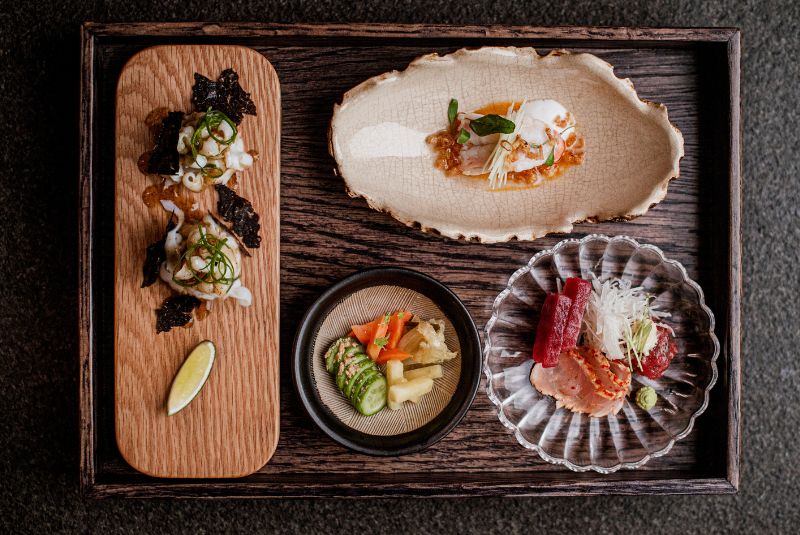
The chef enjoys discovering new uses for unusual produce from the earth and the sea
But this soon became a much wider project, with Bruce-Brand also playing a crucial part. “We've never seen ourselves as a little island, as a restaurant operating in isolation. It's always been important to us that we are part of the broader community and if we can help, we want to get involved,” says Fyn’s CEO.
First, they focused on the team – which was an essential element for Tempelhoff from the start. “I surrounded myself with the best people in the industry and they all bought into the story and the ethos of the restaurant. Together, we've pulled it off, and I want to give them a lot of credit, because they believed in what I believed in,” he says of his long-time partners, culinary director Ashley Moss and service and beverage director Jennifer Hugé.
Fyn has a strong workplace culture, with special attention given to offering employees chances to progress within the team. It is not unusual for people to go from dishwasher to executive sous chef – as is the case for Lucas Caesar, who started working with Tempelhoff in 2014. But even if someone is hired as a dishwasher, as the chef puts it, “we want them to be the best-paid dishwashers in the city – or even the country. We want them to be able to have a life at home, and not just scrape the bottom of the barrel.”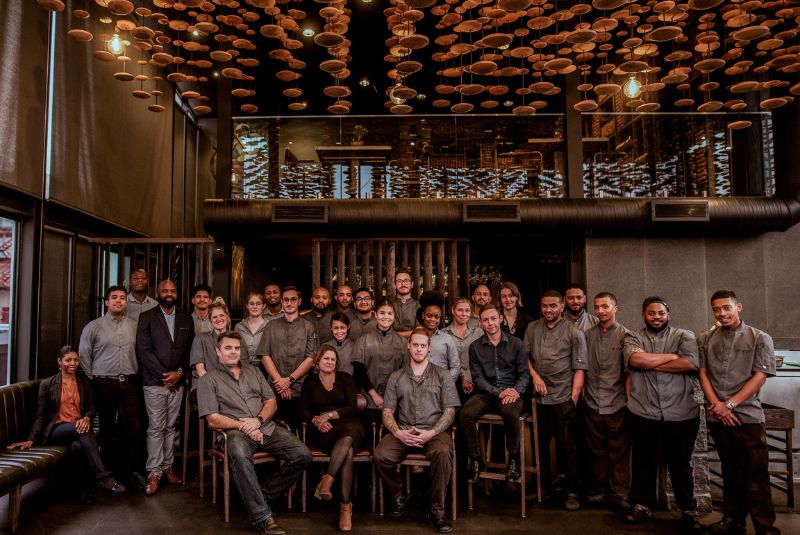
The team at Fyn works four days and rests three days per week
The chef has also implemented a three-days-off system for the entire team, meaning that everyone at Fyn gets an extra 52 days off per year compared to those working Monday to Friday. “I’ve had this model in place since I came back from working in the UK. It has paid dividends in that the team performs better, so I don’t think I will ever change it,” he says.
Bruce-Brand and Tempelhoff also see Fyn’s mission as making people more aware of the abundance of South African ingredients that haven’t yet been brought to the local – and, much less, the international – market. “One day, maybe people will walk into a central market in the US and they'll find some of the Fynbos products in the vegetable aisle,” says Bruce-Brand. “At the moment, these ingredients are just something of beauty and people don't even know that they enabled mankind to survive, but we dream of them lining supermarket shelves.”
Fyn’s multi-faceted approach naturally contributed to it receiving the Flor de Caña Sustainable Restaurant Award at The World’s 50 Best Restaurants 2023, sponsored by S.Pellegrino & Acqua Panna. The winner of the special accolade is selected following an audit by the Sustainable Restaurant Association, which assesses all participating restaurants across several different areas of sustainability.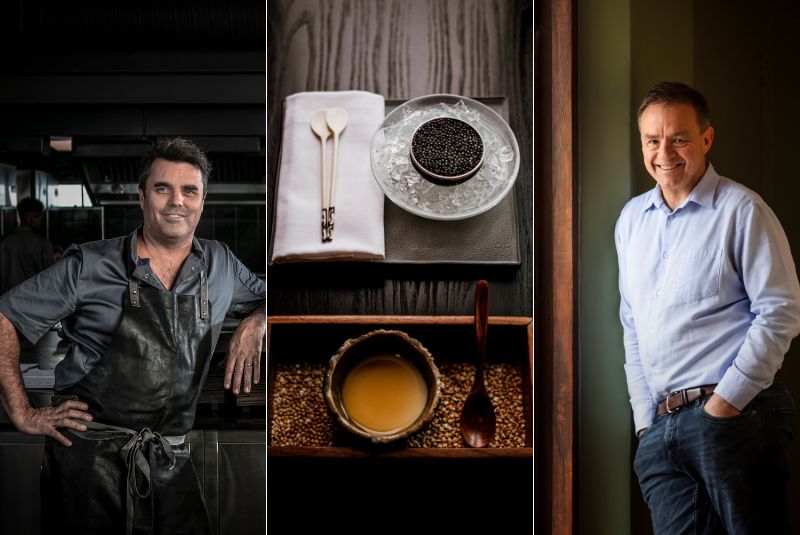
Peter Tempelhoff and Paul Bruce-Brand are passionate about making Fyn as sustainable as it can be
“The award was very unexpected,” comments Tempelhoff. “But we’re delighted and I think all of Africa is delighted with us. The feedback and positivity we’ve been getting from the local culinary industry has been amazing, and it puts pressure on us to be open and upfront about how we do things here, to spread our message of sustainability and how the restaurant is making a difference.”
“It has been super special to tell all the ‘little guys’ about the award,” adds Bruce-Brand. “From the fisherman to our wagyu supplier and everyone else, this is also their award, after all.”
Wide-ranging sustainability: meet five great companies Fyn collaborates with
Infinity Culinary Training, ictchefs.org
Fyn offers internship and employment opportunities as part of the ICT training programme, which provides young adults from disadvantaged backgrounds with the skills necessary to become chefs.
Abalobi, fishwithastory.org
Fyn sources its local seafood from Abalobi, South Africa’s first community-supported fishery, which works with small-scale fisherfolk using low-impact fishing methods.
Nihon Ichiban, anything-from-japan.com
Tempelhoff works closely with Nicolas Soergel, founder of Nihon Ichiban, a company that supports 100-plus-year-old artisanal businesses in Japan facing difficulties due to shrinking domestic markets and lack of successors. From bonito flakes to vinegar, yuzu chilli paste and mirin, the chef imports the Japanese produce he needs for Fyn through one single shipment per year.
The Click Foundation, clicklearning.org
Tempelhoffs cooks at the annual ArtAngels Charity Auction, which raises money for the NGO’s mission to help under-serviced primary schools in South Africa improve foundational literacy, numeracy and digital skills.
Music for Meals
During the pandemic, Fyn partnered with Ellerman House to organise a virtual charity concert called Music for Meals. More than one million South African Rands were raised and were used to fund short- and long-term hunger relief programmes. Rewatch the Music for Meals concert here.
The list of The World's 50 Best Restaurants 2023, sponsored by S.Pellegrino & Acqua Panna, was announced on Tuesday 20th June at a live awards ceremony in Valencia. To stay up to date with the latest news, follow us on Instagram, Facebook, Twitter and YouTube, and sign up to our newsletter.

